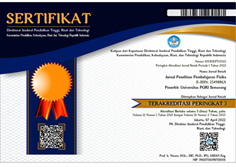Profil Kemampuan Berpikir Komputasional (Computational Thinking) Siswa SMP Negeri Se-Kota Semarang Tahun 2022
Abstract
This study aims to determine the profile of the mastery of computational thinking skills of State Junior High School students throughout the city of Semarang with the benefit of being a benchmark for innovation or development of learning models oriented to mastering the computational thinking skills of State Junior High School students in the city of Semarang. This research was conducted in 15 public junior high schools in the city of Semarang on March 25, 2022 - April 30, 2022. The sample in the study amounted to 15 public junior high schools from a population of 45 public junior high schools in the city of Semarang. Data were taken using a free test instrument to measure students' computational thinking skills and teacher questionnaires to obtain information related to learning science in schools. The free test is given online via google form and offline using a question sheet. The total respondents were 328 students as the research sample. The result of this research is that the profile of mastery of computational thinking skills of State Junior High School students in Semarang city gets a score of 54.97. Based on the results of the study, it can be concluded that students' computational thinking skills are in the medium category and there are still students who have not been able to solve problems with computational thinking skills, namely abstraction, generalization, pattern recognition, decomposition, and algorithms.
Keywords: Computational Thinking, Bebras task, Science Learning for State Junior High Schools of Semarang city
Full Text:
PDFReferences
Riley D D dan Hunt K A 2014 Computational Thinking for The Modern Problem Solver. La Crosse: CRC Press.
Hadayani D O, Delinah dan Nurlina 2020 Membangun Karakter Siswa Melalui Literasi Digital Dalam Menghadapi Pendidikan Abad 21 (Revolusi Industri 4.0). Prosiding Seminar Nasional Pendidikan Program Pascasarjana Universitas PGRI Palembang 21 999–1015.
Prayogi R D dan Estetika R 2019 Kecakapan Abad 21: Kompetensi Digital Pendidik Masa Depan. Jurnal Manajemen Pendidikan 14 (2) 144–151.
Grover S 2018 The 5th 'C' of 21st Century Skills? Try Computational Thinking (Not Coding). Retrieved from.
Ansori M 2020 Pemikiran Komputasi (Computational Thinking) dalam Pemecahan Masalah. Dirasah : Jurnal Studi Ilmu Dan Manajemen Pendidikan Islam 3(1) 111–126.
Wing J M 2006 Computational thinking. Communications of the ACM 49(3) 33–35.
Wing J M 2017 Computational thinking’s influence on research and education for all. Italian Journal of Educational Technology 25(2) 7–14.
Maharani S, Nusantara T, Asari A R, Malang U N dan Timur J 2020 Computational Thinking Pemecahan Masalah di Abad ke-21 (Issue December). Malang: Wade Group.
Malik S 2016 Peningkatan Kemampuan Berpikir Komputasi Siswa melalui Multimedia Interaktif Berbasis Model Quantum Teaching and Learning. Skripsi Universitas Pendidikan Indonesia, Juni.
So H J, Jong M S Y dan Liu C C. 2020 Computational Thinking Education in the Asian Pacific Region. The Asia-Pacific Education Researcher 29(1) 1–8.
Sugiyono 2013 Metode Penelitian Kuantitatif, Kualitatif dan R&D. Bandung: Alfabeta.
Maksum K, Afifah N, Ardiyaningrum M dan Sukati S 2022 March 4). Pengembangan Instrumen Tes Keterampilan Berpikir Komputasi pada Pelajaran Matematika Sekolah Dasar (SD)/ Madrasah Ibtida’iyah (MI). MODELING: Jurnal Program Studi PGMI 9(1) 39-53.
M. Gunawan Supiarmo, Turmudi dan Elly Susanti 2021 PROSES BERPIKIR KOMPUTASIONAL SISWA DALAM MENYELESAIKAN SOAL PISA KONTEN CHANGE AND RELATIONSHIP BERDASARKAN SELF-REGULATED LEARNING. Numeracy 8(1) 58-72.
Mufidah I 2018 Profil Berpikir Komputasi dalam Menyelesaiakan Bebras Task Ditinjau dari Kecerdasan Logis Matematis Siswa. Skripsi UIN Sunan Ampel Surabaya, November 1–110.
Patonah S, Nuvitalia D, Saptaningrum E dan Wuryandini E 2020 Inquiry Learning Tools to Train Science Process Skills at The Junior High School Level. JPPS (Jurnal Penelitian Pendidikan Sains) 9(2) 1812–1818.
Nuvitalia D 2014 Elemen Bernalar: Implikasi Dan Akibat-akibat Pada Indikator Mengantisipasi Serta Mencari Solusi Terhadap Masalah Melalui Metakognisi. Jurnal Phenomenon 4(2) 43-52.
Mauliani Annisa 2020 Peran Penting Computational Thinking terhadap Masa Depan Bangsa Indonesia. Jurnal Informatika dan Bisnis 9(2) 1-9
DOI: https://doi.org/10.26877/jp2f.v13i2.12794
Refbacks
- There are currently no refbacks.
Copyright (c) 2022 Jurnal Penelitian Pembelajaran Fisika

This work is licensed under a Creative Commons Attribution-ShareAlike 4.0 International License.
Attention:
Starting vol. 15 issue 4 October 2024 JP2F has moved to a new website address
https://journal2.upgris.ac.id/index.php/jp2f/index
The submission process will only be served on the web above.
Copyright of Jurnal Penelitian Pembelajaran Fisika ISSN 2086-2407 (print), ISSN 2549-886X (online)
Gedung Utama GU.2.01 FPMIPATI, Universitas PGRI Semarang
Jl. Lontar No. 1-Dr. Cipto, Kampus 1 UPGRIS, Semarang
Email: jp2f@upgris.ac.id









